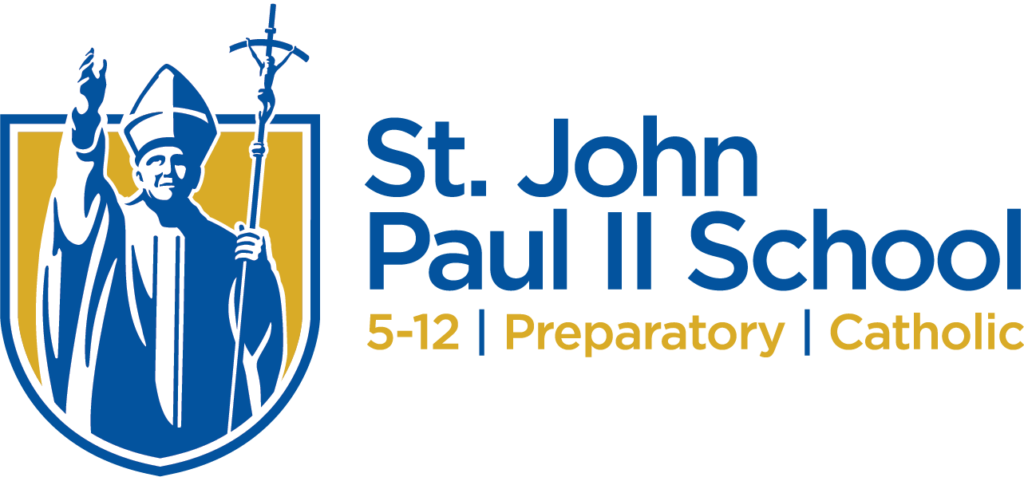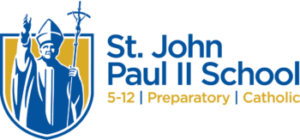Delivered by Samantha Carlowicz ’17 during Cape Cod Catholic Schools Week Mass
with Bishop Edgar da Cunha and students from St. John Paul II High School,
St. Francis Xavier Preparatory School, St. Pius X School, and St. Margaret Regional School.
 Good morning, everyone. My name is Samantha Carlowicz and I am a senior at St. John Paul II High School and graduate of St. Margaret Regional School.
Good morning, everyone. My name is Samantha Carlowicz and I am a senior at St. John Paul II High School and graduate of St. Margaret Regional School.
Mr. Keavy asked me to share a few ideas about Catholic schools with you, as one who has attended Catholic schools for the whole of my educational career – Kindergarten to Senior Year – and at only those two schools. Needless to say, I have spent almost three quarters of my life in roughly the same community of people, and I wouldn’t want it any other way.
Ever since middle school, the one thing I have always said was my favorite thing about Catholic Schools is that the people are like a family to me. Three characteristics of any family, including our Catholic School family, in particular stand out to me; the focus on knowing one another, caring for one another, and having shared values and traditions.
A couple of weeks ago, I had a bit of free time after school so I decided to visit St. Margaret’s just to say hello to a couple of teachers and students. It was dismissal time so there were teachers out greeting parents as usual, and as I approached, several teachers came over to me to greet me.
Now the first question I was asked was the obligatory “How are you?” but what followed surprised me.
They asked me, “So, how are your parents? How’s your sister? What’s she been up to? How’s your brother? Is your dad still commuting or working from home?” Walking into a school, you would’ve expected a “How’s your schoolwork been?” or “Are you getting good grades?”
No, no. This was like walking into a family holiday party and having your aunt or uncle strike up a conversation with you over a bowl of crackers.
The thing about Catholic schools is that these people – teachers, parents, even fellow students – do not just know us enough to know where our parents work or what we’ve been up to at school, but they care about us as individual people.
When I’ve talked to friends I’ve met over the years who attend different schools about their school-life, they usually respond that “school is school.” Here at our Catholic schools, however, school is spoken of lovingly because our school is rooted in love; the love of Christ for each and every one of us.
Although all of us can attest to the ideas of knowing one another and caring for one another as a school-family, one of the other aspects that is often forgotten is the importance of having shared traditions and values. In a Catholic school, no matter what classes you take, one of them will always be religion. Therefore, just walking into school you already have at least one thing in common with every other person around you.
Over the summer, I worked as a camp counselor at Camp Farley (looking around, I now know some of you because you were my campers).
During our training before the campers arrived, we were talked to about how we should interact with the campers and about what “good” and “bad” topics of conversation were. What struck me was that under the list of things we should avoid talking about was religion.
At first, that didn’t seem like a problem to me, I just wouldn’t talk about it. However, I soon realized just how difficult it was to be surrounded by people that either would not understand what I was talking about or who I could not even talk to about my faith.
Every Sunday morning over the summer, I’d wake up and go to Church, change into my staff shirt, and arrive at camp before noon. Whenever I heard something in Church that inspired me or made me think, I had to keep it to myself rather than share it because I was in an environment that wasn’t faith based.
It’s easy to take for granted the atmosphere of shared traditions and values we have here at our Catholic schools. For me, it was not until I was in an atmosphere where the Catholic faith was not a central part that I realized just how valuable it is to have a family of people who understand what you believe in.
In addition to having a community rooted in a shared history and support for one another, Catholic schools are creating individuals who are knowledgeable in their faith. Individuals who can, as many of our teachers say, be the best people we can be because of that knowledge.
Even though we are all at different stages in our lives, we will all come to realize how understanding our faith influences our lives. Here’s how I realized that.
In middle school, the best yet most frustrating class was always Mrs. Caradimos’ science class (don’t worry, Mrs. Caradimos, it will make sense in a minute). My classmates and I often complained about what we were learning because we said it was confusing or didn’t make sense. All these formulas and definitions and ideas were just packed away in our brains like papers stuffed in a folder. Then Mrs. Caradimos would tell us we were going to do a lab, resulting in only more grumbling and complaints. But then, as we were following whatever steps were laid out for us in the experiment, something would click. Bam! In a single moment, like magic, it all made sense; the formulas, definitions, all of it suddenly organized itself into something we could understand.
It sounds nerdy, but attending a Catholic school for 12 years is much like learning science. All this time, we’ve been learning about who God is and what the Church has to do with that and what our jobs as a disciples are.
For me, all this knowledge of faith has been piling up in my head for a while, but now I am finally experiencing those “Bam-moments” where it all just clicks.
And this knowledge of faith I have really does influence the decisions I make every day. I am at the point now that I know enough about what I believe and what the Church teaches that I actually stand up for what I believe in when other people do not understand.
Now, knowing again that we are all at different stages of our lives, you may wonder how this applies to you; what does this mean for the future.
As I am sure many of you will agree, the most common question for us young people is the classic “What do you want to do when you grow up?”
Being a senior – and I know it applies to my fellow seniors and to all you 8th graders as well – it seems as though this is the only conversation I have with anyone.
For me, I plan on attending college next year and pursuing a degree in engineering. Of the four colleges I have applied to, only one is a Catholic school; the other three are science-based institutions. What this means for me is that this may very well be my last year attending a Catholic School.
And that? That seems really strange to me. Pursuing science as a career is something I truly feel called to do; I love science after all and have come to love how the scientific and theological worlds intertwine.
However, I also understand that many people who pursue science do not believe in the Catholic faith, or really any faith at all. And this concerns me sometimes because I want to believe in the future what I believe now, that God is the center of my life and my salvation.
I want to continue to have that knowledge of faith, that family of faith I have now. However, deep down I know that wherever I decide to go, it is because that is where God is leading me. Because my life has been built upon a foundation of faith through my experience in Catholic schools, I know that I will find God wherever I am, and that’s a pretty sweet thing to know.
In Harper Lee’s To Kill a Mockingbird, a book I’m sure many of you are or will be familiar with, the main character Scout says this of her best friend, Dill: “With him, life was routine; without him, life was unbearable.”
For us, our “him” is Jesus, is our faith. With Him, life is routine; as routine as going to school every day. Without Him? Life would be unbearable.
On behalf of all the students and staff members of our Catholic schools, thank you Bishop da Cunha and the priests of the Cape Cod Deanery for celebrating Mass with us today. Thank you, and may God bless our Catholic Schools.

